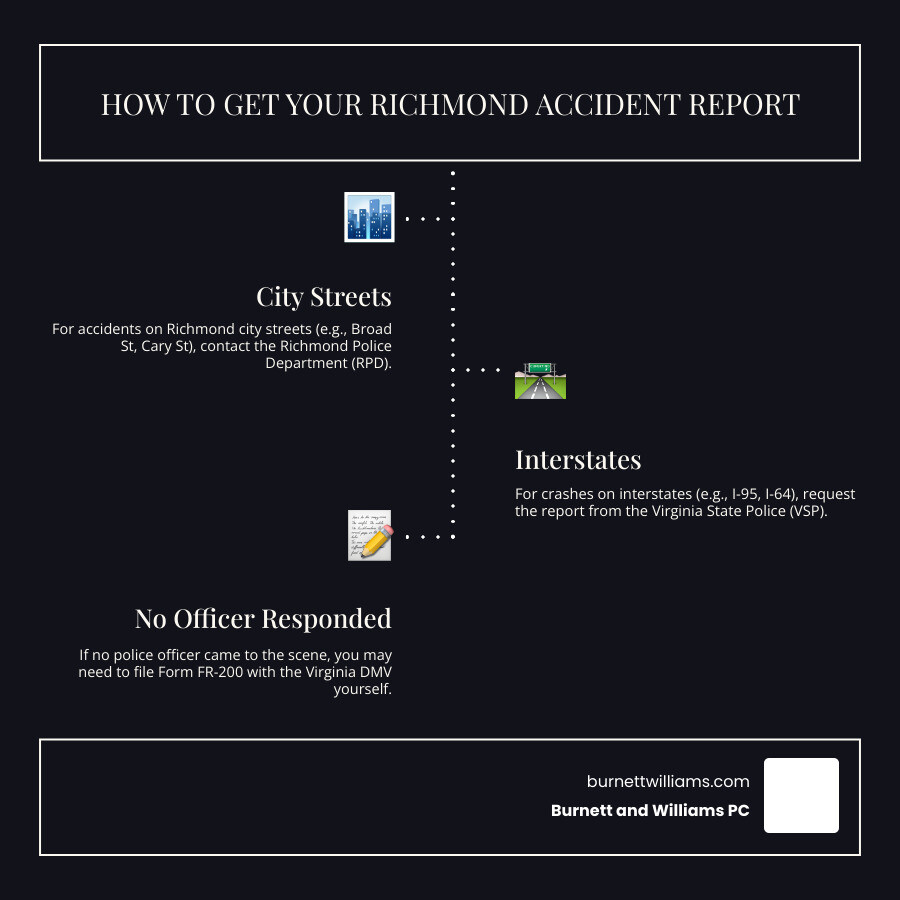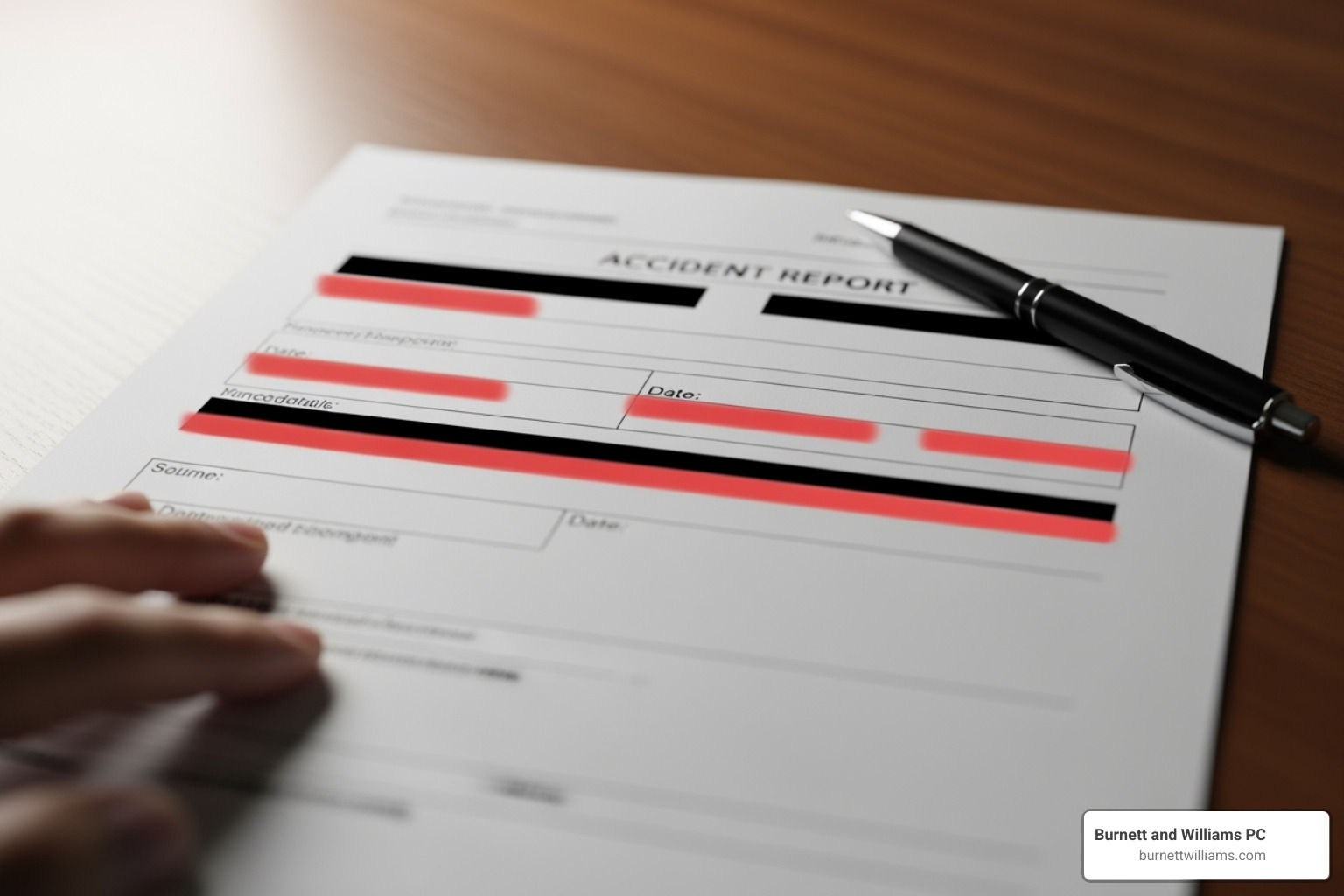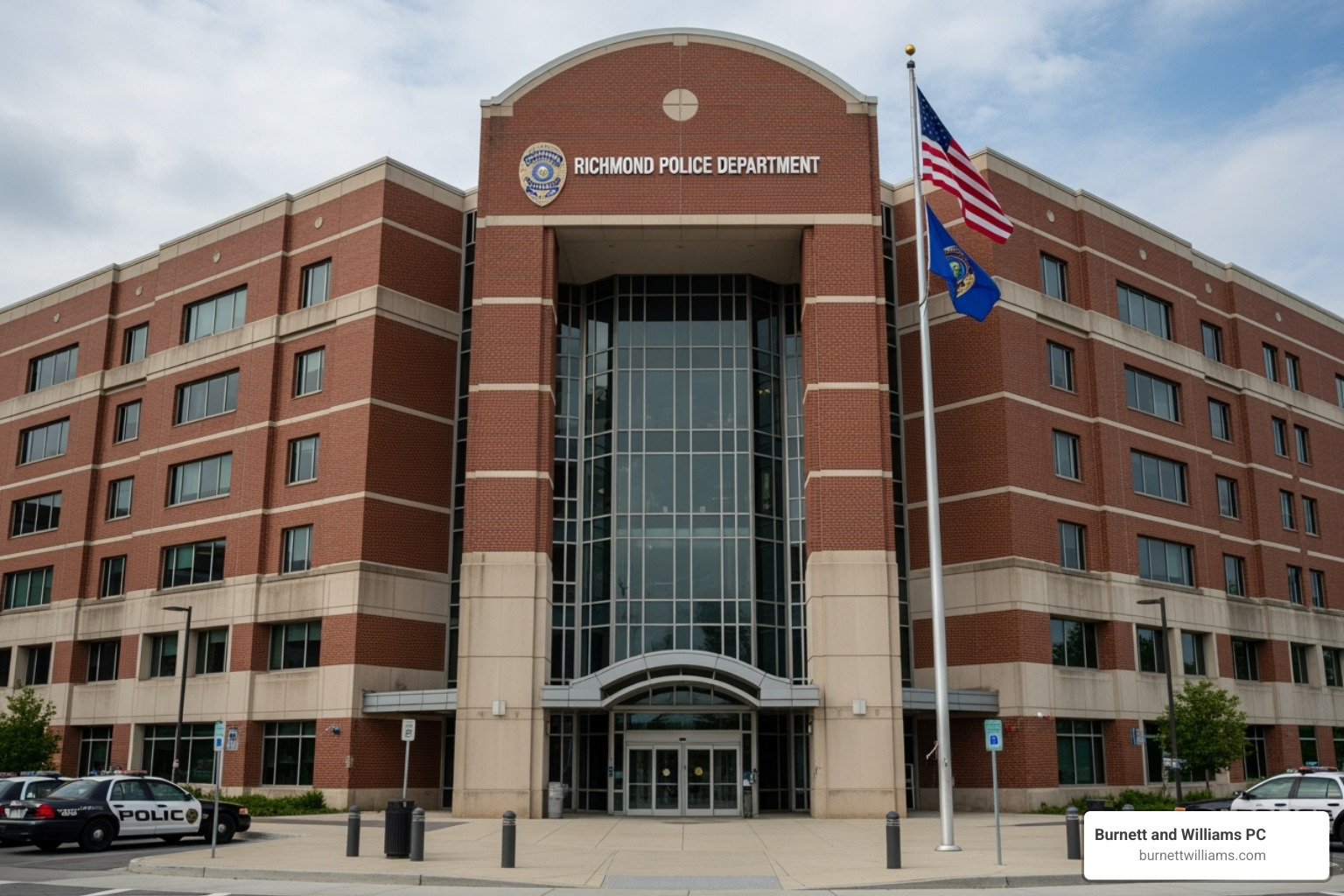Why Getting Your Police Report is Critical After a Richmond Accident
If you’ve been in a car accident in Richmond, VA, getting the police report should be one of your first priorities after seeking medical care. This official document can significantly impact your insurance claim and any potential legal case.
Quick Steps to Get Your Richmond Car Accident Report:
- City streets (Broad St, Cary St, etc.): Contact Richmond Police Department or DMV
- Interstates (I-95, I-64): Request from Virginia State Police
- No police came: File Form FR-200 with Virginia DMV
- Bring: Date, location, driver names, and case number if available
- Expect: $8-15 fee for copies
The police report serves as the foundation for your insurance claim and any legal action. In 2022, Richmond City alone saw 5,721 car accidents, with nearly half involving serious or fatal injuries. Without proper documentation, you could face an uphill battle proving what happened and who was at fault.
Virginia’s strict contributory negligence law means even small mistakes in how your accident is documented can cost you thousands in compensation. The report contains the officer’s diagram, witness statements, and initial fault determination that insurance companies rely heavily on when processing claims.
Getting your report quickly also helps you meet Virginia’s legal deadlines and ensures you don’t miss critical details while they’re still fresh.
Why the Police Report is Crucial After a Car Accident in Richmond VA
When you’re dealing with the aftermath of a car accident in Richmond, VA, that police report isn’t just another piece of paperwork. It’s your shield against insurance disputes and your foundation for any legal action you might need to take down the road.
Think of it this way: in those chaotic moments right after a crash, everyone remembers things differently. Emotions run high, details get fuzzy, and stories start to change. The police report cuts through all of that noise with an official, unbiased account of what actually happened.
The Report as a Key Piece of Evidence
Your police report becomes the backbone of your insurance claim from day one. Insurance adjusters don’t want to play detective, so they lean heavily on what the responding officer documented. The report’s property damage assessment helps establish repair costs, while the injury documentation creates a clear link between the crash and any medical treatment you need.
But here’s where it gets really important: the officer’s diagram and narrative paint a picture that’s worth a thousand words in court. These aren’t just rough sketches. They show vehicle positions, skid marks, traffic signals, and road conditions. When combined with any witness statements the officer collected, you’ve got a comprehensive record that’s hard to dispute.
This official record is especially important in Virginia because the Commonwealth follows a harsh rule called contributory negligence. If you are found even 1% at fault for the accident, you could walk away with nothing. That makes the police report’s initial fault determination incredibly valuable. Our experienced Personal Injury Lawyers Virginia know exactly how to use these reports to protect your rights and maximize your compensation.
Understanding Virginia’s Reporting Requirements
Virginia doesn’t mess around when it comes to accident reporting. VA Code § 46.2-371 sets out when drivers must report a crash in Virginia.
You’re legally required to report any accident involving injury or death, period. No exceptions, no matter how minor the injury might seem at the time. The property damage threshold is $1,500. Accidents on private property that is open to the public can also trigger these requirements when the injury or damage threshold is met.
Officers have their own duties under VA Code § 46.2-373. They must file their reports with the Virginia DMV promptly, typically within 24 hours after completing the investigation, creating that crucial official record while details are still fresh. This quick turnaround helps prevent the “he said, she said” battles that can drag out insurance claims for months.
Understanding these requirements isn’t just about following the law. It’s about protecting yourself. When you know what should be documented and when, you’re better positioned to ensure nothing falls through the cracks after your accident. For detailed information about Virginia’s reporting process, check the official police accident report guidelines from the Virginia DMV.
Step-by-Step: How to Obtain and Use Your Accident Report
After the dust settles from your car accident in Richmond, VA, getting your hands on that police report becomes your next important mission. The good news is that the process is straightforward once you know where to look, and it depends entirely on where your accident happened. Almost all police crash reports in Virginia are filed with the DMV, and you can request the police report directly from them.
Requesting a Report from the Richmond Police Department (RPD)
When your accident occurs on Richmond’s busy city streets like Broad Street, Cary Street, or anywhere within the city limits, the Richmond Police Department handles the investigation. Think of RPD as your go-to source for any crash that didn’t happen on the interstate.
Getting your report from RPD is easier than you might expect. The most convenient option is in-person at the RPD Headquarters lobby, located at 200 W. Grace St., Richmond, VA 23220, which allows you to submit your request and receive a copy, if available, at the same time. The fee is $5 CASH or a money order made payable to the City of Richmond. You’ll need to have some basic information ready: the accident date, exact location, and names of everyone involved. If the officer gave you a case number at the scene, definitely have that handy, as it speeds things up considerably.
Obtaining a Report from the Virginia State Police (VSP)
Interstate accidents are a different story entirely. If your crash happened on I-95, I-64, or any other major highway around Richmond, the Virginia State Police were likely the responding agency. This means you’ll need to redirect your efforts away from local police and toward the VSP.
The VSP offers an online system for crash report requests, which tends to be the fastest route to getting your report. Their process is similar to RPD’s, but you’ll need to be more specific about location details. Instead of just saying “near downtown,” you might need the specific mile marker or highway exit number.
You can also request your report by mail through the VSP, though this naturally takes longer. Either way, having precise information about when and where your accident occurred on the interstate will make the process much smoother.
What to Do If No Police Report Was Filed for Your Car Accident in Richmond VA
Sometimes life throws you a curveball, and no police officer shows up to document your accident. This often happens with minor parking lot fender-benders or small collisions where damage appears minimal and no one seems hurt.
Don’t panic if this happens to you. Virginia law requires you to file your own report using Virginia DMV Form FR-200 if your accident meets certain criteria: any injury, death, or property damage exceeding $1,500. This self-reporting requirement ensures there’s still an official record, even when no officer was present.
Even for accidents that don’t meet the reporting threshold, protecting yourself means gathering contact and insurance information from everyone involved, taking plenty of photos of vehicle damage and the scene, and getting witness contact information if anyone saw what happened. Your insurance company needs to know about the accident immediately, regardless of how minor it seems.
What looks like a small accident today can develop into something bigger tomorrow. Injuries don’t always show up right away, and that small dent might hide more expensive damage underneath. Understanding the Dangers of Texting and Driving and other distractions can help prevent these situations, but when they do happen, thorough documentation is your best protection.
Reviewing Your Report and Seeking Legal Guidance
Once your police report arrives, don’t just file it away. Take time to read through every detail carefully, checking for any factual errors like wrong dates, incorrect vehicle information, or inaccurate accident locations. While you can’t change the officer’s opinions or fault determinations, factual mistakes can often be corrected by contacting the investigating agency.
Understanding what your report means for your case is crucial, especially in Virginia, where our strict contributory negligence rule can be unforgiving. If the report suggests you contributed to the accident in any way, you could be barred from recovering any compensation at all. This makes every detail in that report significant for your financial future.
Are Police Reports Admissible in Virginia Personal Injury Cases?
In most Virginia personal injury trials, a police report is not admissible as evidence. Under Virginia’s hearsay rules, the report is considered an out-of-court statement and can’t be used to prove fault or the truth of what’s written.
However, the investigating officer can testify about what they saw — such as road conditions, vehicle damage, or weather. In limited situations, parts of the report may be used:
- To refresh the officer’s memory on the stand.
- To challenge a witness’s credibility (impeachment).
- If it contains an admissible statement by a party.
Because police reports are rarely admitted in full, having an experienced Virginia personal injury attorney is crucial to presenting the proper evidence to the jury.
You also need to keep Virginia’s two-year statute of limitations (Virginia Code § 8.01-243) in mind. This legal deadline means you have limited time to file a lawsuit after your accident, making it important to understand your options sooner rather than later.
At Burnett & Williams PC, we’ve helped countless Richmond drivers steer these exact challenges. We offer free consultations to review your police report, explain what it means for your case, and walk you through our entire Case Process for Vehicle Accidents. Our approach means you’re involved in every decision, and we’re always available to answer your questions.
If you’ve been in a car accident in Richmond, VA, don’t try to figure this out alone. We’re here to help you understand the legal complexities and fight for every dollar of compensation you deserve.


